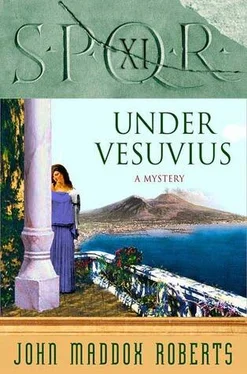John Roberts - Under Vesuvius
Здесь есть возможность читать онлайн «John Roberts - Under Vesuvius» весь текст электронной книги совершенно бесплатно (целиком полную версию без сокращений). В некоторых случаях можно слушать аудио, скачать через торрент в формате fb2 и присутствует краткое содержание. Жанр: Исторический детектив, на английском языке. Описание произведения, (предисловие) а так же отзывы посетителей доступны на портале библиотеки ЛибКат.
- Название:Under Vesuvius
- Автор:
- Жанр:
- Год:неизвестен
- ISBN:нет данных
- Рейтинг книги:3 / 5. Голосов: 1
-
Избранное:Добавить в избранное
- Отзывы:
-
Ваша оценка:
- 60
- 1
- 2
- 3
- 4
- 5
Under Vesuvius: краткое содержание, описание и аннотация
Предлагаем к чтению аннотацию, описание, краткое содержание или предисловие (зависит от того, что написал сам автор книги «Under Vesuvius»). Если вы не нашли необходимую информацию о книге — напишите в комментариях, мы постараемся отыскать её.
Under Vesuvius — читать онлайн бесплатно полную книгу (весь текст) целиком
Ниже представлен текст книги, разбитый по страницам. Система сохранения места последней прочитанной страницы, позволяет с удобством читать онлайн бесплатно книгу «Under Vesuvius», без необходимости каждый раз заново искать на чём Вы остановились. Поставьте закладку, и сможете в любой момент перейти на страницу, на которой закончили чтение.
Интервал:
Закладка:
One day I went to the lovely little town of Pompeii. Actually, all the towns of this district are beautiful. Pompeii showed off its greatest adornment by entertaining me with an afternoon in the amphitheater. This splendid structure is made of stone, taking advantage of a natural depression in the ground. The depression was improved by digging, forming a perfect oval that was lined with stone seats. The outer, aboveground wall is a complete circle of graceful arches, decorated with fine carvings. One enters this imposing structure by ascending a double stair built against the outer wall, then taking one of the inner stairs that descend among the seats.
This clever building seats no fewer than twenty thousand people.
That is not a great number compared to Rome's Circus Maximus, which can accommodate one hundred thousand, but it is huge for a town the size of Pompeii, which lacks sufficient free population to fill half these seats. At festival time, people from all the surrounding countryside and nearby towns flock to Pompeii to attend the spectacles.
On that afternoon the gladiators from the local school came out to entertain us. Since the occasion was not a munera, the fights were not to the death but only to first blood or a declared decision. We lounged at our ease in the editor's box as they marched out in their finery, colored plumes nodding from helmets, the sun flashing on polished armor, blades and spearpoints glittering.
Campania is the homeland of this dangerous sport. The funeral combats are enormously popular in Rome, but in Campania they form a veritable cult. These men were as fine and skillful as any I had ever seen, fearless and tireless as they fought in pairs, matching a man from one style with another of contrasting weapons: large shield against small shield; sword and shield against net and trident; spear against sword; curved sword against straight; even a man who fought with a sword in each hand against a heavily armored man with a small shield and a spear. Two teams of horsemen pelted one another with javelins.
Hermes and I, and the other men of my following, enjoyed all this immensely. Julia had chosen not to attend and forbade the women of our party to go. She said that, since women were forbidden by law to attend the munera , there was no reason why they should go to the sham fights. Of course, women went to the fights anyway and nobody stopped them, but Julia was a great stickler for the proprieties during those years. (In more recent years, the First Citizen has reinstituted the adult-male-citizen-only rule for the munera. It has not improved his popularity. Half the fun was seeing how excited the women got.)
In the box with us that day was a man whose dress and beard were Greek, and everything about him reeked of wealth. He took a keen interest in the fights and seemed knowledgeable about the fighters, for he knew each man by name, his style, and the number of his victories. When the two-sword man and his opponent came out, he leaned toward me and said, "Praetor, which of these two do you fancy?"
I could not imagine how a man bearing two offensive weapons could defend himself properly. "I favor the spearman. He has good armor and a shield. He can attack and defend himself at the same time. The other man can only attack."
"That is the conventional interpretation, but there is nothing conventional about such a fight." He smiled in that superior Greek way. "I think that, should you bet on the two-sword man, you will leave this place richer than when you arrived."
"Who would take such a bet?"
The Greek looked around, then said, "Since no one else seems inclined, I will bet on the spearman myself. One thousand sesterces, five-to-one odds."
"Five-to-one in whose favor?" Hermes wanted to know.
"In the praetor's of course. If my man wins, he pays me a thousand. If his wins, I pay him five thousand."
"Why would you bet at five to one on a man you think will lose?" I asked him.
He smiled again. "I am a sportsman. I like long odds."
"Very well, then," I said, curious to see where this would lead. "Done."
We settled down to watch the match. The men saluted and then squared off under the sharp eye of a trainer. Other trainers armed with staves stood by, ready to separate the combatants should they get carried away and actually try to kill each other, a not uncommon occurrence among these spirited men.
The spearman wore a leather sleeve covered with metal plates on his weapon arm and high greaves strapped to both legs. His helmet had wide cheek plates with throat protectors. To defend his body he had a round, deeply convex shield. To supplement his spear he carried a straight, slender sword behind his shield. This was a type of fighter rarely seen in Rome but popular in the south.
By contrast, the other man was all but unprotected. He wore a light helmet and had studded leather guards on both forearms, and that was the extent of his protective gear. His swords were legionary type: twenty inches long, straight, broad and double-edged.
They looked to me for the signal, and at my nod the trainer shouted, "Begin!"
The two went at it immediately, with the two-sword man pressing in aggressively, forcing the other man back several steps and seeming, to me, to expose himself recklessly.
"A pair of double-edged gladii," said the Greek, "means about eighty inches of razor edge. That is a formidable thing to face."
I'd thought of that myself, but I was more interested to see how my man was going to defend himself from that spear, which had reach. This became quickly apparent. When the spearman thrust, my fighter used his left-hand sword to block while simultaneously aiming a thrust at the other's face. And so it went through several exchanges; each time the spearman attacked, the swordsman used one weapon to defend, immediately counterattacking with the other.
This was what I had not anticipated. A soldier uses his sword to block only as a desperate measure. Clanging sword against sword damages both weapons. Swords are expensive, and you want to keep yours in good condition for the rest of the battle. Thus, soldiers depend on their shields and armor for defense, reserving the sword for attack against an enemy's vulnerable areas. Swords are intended to cut flesh, not wood or metal.
But, I now saw, if you had two swords, and were paying for neither of them, you could afford to let them get notched, blocking and parrying your enemy's weapons. You'd get new swords for the next fight. Plus, you could keep your enemy guessing which sword was going to be used for what.
Both men fought with exceptional spirit and skill, and we were all jumping to our feet and shouting like boys attending their first munera. The spearman crouched behind his shield and tried to keep the other at a distance with short thrusts, first toward the face, then at the body and legs. The swordsman danced out of the way, sprang forward and back, and kept drawing the other's shield up and down by attacking from different directions. He hoped to tire his opponent's shield arm and create an opening that would let him attack the unprotected torso.
Finally, the spearman overextended on a thrust, and the left-hand sword came down, shearing away the iron point. Immediately, the man dropped the useless shaft and snatched the reserve sword from behind his shield. But in that instant the right-hand sword darted in over the shield and scored a cut on the man's shoulder.
Immediately the men with staves jumped in and separated the two fighters while we cheered and applauded. The loser's wound bled freely but it was only a superficial cut, the best sort of wound for a gladiator: a real crowd-pleaser that doesn't incapacitate the man.
"It seems that you won, Praetor," said the Greek. He reached into his robe and drew out a well-stuffed sack, which he handed to Hermes. "Sport doesn't get better than that. I am Diogenes, perfume importer and partner of Manius Silva. Please accept these gifts for your esteemed lady." He reached behind him and a slave placed a small wooden box in his hands. The Greek worked the latch and raised its lid. Within, nestled in fine wool felt, were perhaps twenty exquisite little glass vials filled with clear liquid, some colorless, others amber tinted. "These are a modest sampling of the perfumes I import. I hope she will find them pleasing."
Читать дальшеИнтервал:
Закладка:
Похожие книги на «Under Vesuvius»
Представляем Вашему вниманию похожие книги на «Under Vesuvius» списком для выбора. Мы отобрали схожую по названию и смыслу литературу в надежде предоставить читателям больше вариантов отыскать новые, интересные, ещё непрочитанные произведения.
Обсуждение, отзывы о книге «Under Vesuvius» и просто собственные мнения читателей. Оставьте ваши комментарии, напишите, что Вы думаете о произведении, его смысле или главных героях. Укажите что конкретно понравилось, а что нет, и почему Вы так считаете.









